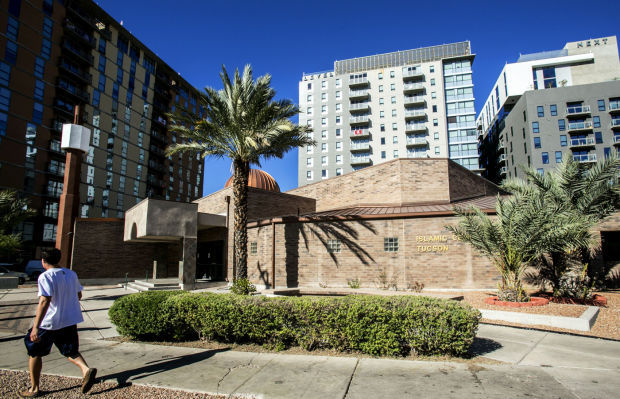Neighbors say they have had enough with disruptive behavior from college students living in off-campus housing.
A series of conversations have taken place after recent incidents of students throwing objects from balconies of high-rise apartments immediately north of the Islamic Center of Tucson. Community members in the area reported regularly having garbage and sometimes, dangerous objects thrown into their properties and trouble with loud parties and rowdy behavior toward residents and mosque-goers.
In response, two University of Arizona professors started an online petition to put an end to what they call “unacceptable” behavior, and a second community forum with a panel of city, UA and neighborhood representatives took place at the university on Monday to hear the public’s concerns and discuss possible solutions.
Monica Casper, head of the Department of Gender and Women’s Studies at the UA, and Adela Licona, an assistant professor of English, began the petition titled, “Not On Our Block: A collective response to attacks on the Islamic Center of Tucson.”
“The University, especially in its role as a land-grant institution, has a responsibility to those who live, work, and worship here,” they wrote in a statement on the petition’s web page. “Collectively, we have a responsibility to educate and to ensure that all members of our community – within UA and without – can thrive.”
They were not immediately available for interviews on Monday and Tuesday, but wrote in the petition that they would hold community conversations to “promote shared understanding” in the coming months. As of Tuesday evening, the petition received 252 signatures out of 500, which is their goal.
At the Monday community forum, hosted by Ward 6 Councilman Steve Kozachik and the University of Arizona, community members said they were fed up with noisy parties, disturbances and vandalism in areas of off-campus housing for UA students and Greek houses.
The forum sought to find solutions to increase the livability of all residents in communities with students.
This is an issue for the whole community and not just the Islamic Center, said Diana Lett, a resident of the Feldman’s neighborhood which stretches north from Speedway to Lee Street and west from Stone Avenue to Park Avenue.
“What we have is that some students believe they are entitled to behave exactly as they please regardless of disturbance to the community,” she said. “This culture needs to change.”
Attendees of the forum raised concerns for safety of all people who live and work in the area where there are large student housing complexes, property damage, poor designs of high-rise buildings, noise disturbances, public intoxication, threats to other residents from students, cultural insensitivity and lack of oversight from the UA.
“We’ve been fortunate that no one has been severely injured at this point,” said Tucson Police Chief Roberto Villaseñor, echoing many of the community members’ sentiments. The department will have a zero tolerance policy against students displaying disruptive behavior, he said. It has already issued red tags to off-campus student housing complexes.
Tannya Gaxiola, assistant vice president for UA’s community relations office, encouraged any neighbors having problems with students to call the community relations office and not to wait until things escalate and get “out of control.”“We want to make sure that our students learn to be good citizens,” she said.
Community members offered up suggestions on possible solutions. Many agreed that evictions of problem students were not a permanent solution. The prevailing suggestion, among a collection that included expelling students who are found guilty of causing disturbance to send a strong message about consequence, and strengthening police enforcement, was to enclose the balconies of high-rise apartment buildings.
Omar Hussain, a UA senior and a public relations officer at the Islamic Center, said that he would not renew his parking permit at the center for fear that his car would one day be seriously damaged, but encouraged the audience to remember that of the hundreds of residents living in the towers, a few of them have shown bad behavior.
The management inherited the problems when it bought the buildings in July, said Alex O’Brien, a representative of Cardinal Management Group, which owns Next and Level apartments on North Tyndall Avenue. Since then, he said it has worked to alleviate the situation by installing additional security cameras and guards, and having a manager live on-site. It has also carried out five evictions out of the eight notices that were served in the past few months, he added.
On the possibility of enclosing balconies at Next and Level apartments, O’Brien said while nothing is off the table, the management would wait to see if the situation improves with measures they have already taken.
Kamel Didan, vice chairman of the board of the Islamic Center, kept his message to a positive note at the forum, inviting attendees to a celebration of a new religious leader on Friday evening. He said he wants to work together with the community to be the “positive community members that we aspire to be.”
“I don’t want us Muslims to be seen as anti-business or anti-development or even anti-fun,” he said.





